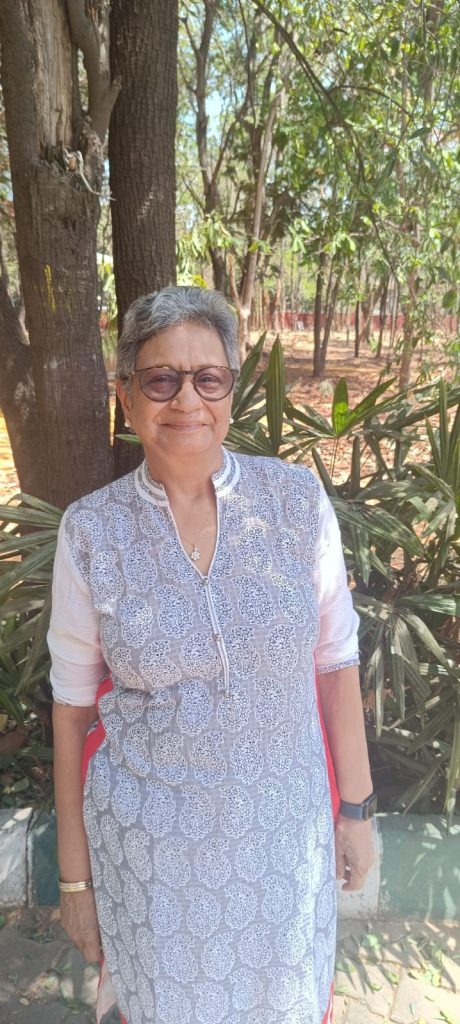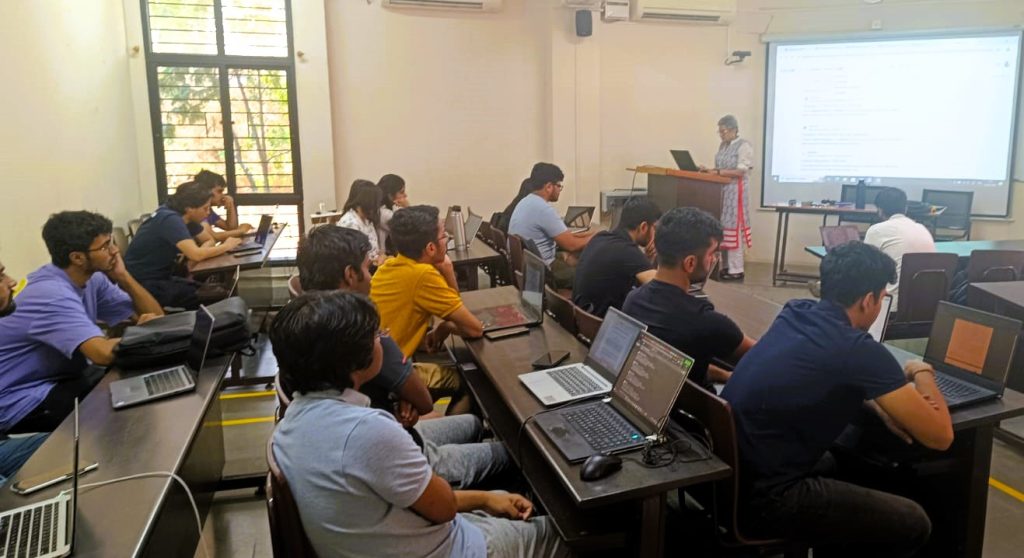Interview with Jayashree Watal, Former Senior Officer of the WTO, and Visiting Faculty at NLSIU
April 22, 2024
We are delighted to have Ms. Jayashree Watal at the NLS campus as a Visiting Faculty this trimester. Ms. Watal was formerly a senior officer in the Intellectual Property, Government Procurement and Competition Division of the World Trade Organization, where she worked from 2001-2019. She is a specialist in the Trade-Related Aspects of Intellectual Property Rights (TRIPS) Agreement, in particular in relation to public health. Prior to joining the WTO, Ms. Watal had more than 22 years of experience in the Government of India.
Jayashree is currently a Visiting Professor at the National Law University, Delhi and an Adjunct Professor at the Georgetown University Law Center, Washington D.C. In addition, she is a consultant for intellectual property matters for the Department of Business and Trade, Government of UK, for the WIPO – Harvard University PatentX course on Patents and Global Health and for the International Trade Centre (ITC), Geneva. In this interview, she shares more about her association with NLS, her teaching, and her experiences.
 Have you had previous engagements with NLS prior to this visit?
Have you had previous engagements with NLS prior to this visit?
I remember my first interaction with NLS very clearly. When I was in the WTO, I was invited by a few students at NLS and I was pretty shocked because I had no idea that students here were so proactive! I don’t remember the exact year but this must have been in the late 2000s when I got an invitation from a female student who wrote to my WTO email address saying: “When you’re next in India, could you come and give us a talk on the TRIPS agreement and the negotiations, and so on”. This was a completely student driven initiative and they had even collected funds on their own to facilitate this; and in fact I think some of the staff and faculty were pretty surprised that I was on campus based on a student invitation. The students paid my fare from Delhi to Bangalore, picked me up at the airport, brought me to the Guest House and handled everything, so that was my first exposure to NLS and to the student community here.
I realised that one of the reasons NLS has such a good name is because of the quality of its students; they take initiatives which are in their academic interest, and because they’re interested in the subject itself, so I was very impressed!
Besides that visit, I’ve come here for panel discussions on two different occasions, one of which was organised by the late Professor Shamnad Basheer. I don’t think he was teaching here at the time but he used to organise these interesting panel discussions. All these trips were flying visits so this is the first time I’ve come to NLS for a longer stay of nearly two weeks.
Is this your first time teaching at NLS?
Yes. The reason why I never thought of teaching at NLS earlier is because it’s not very convenient to come teach in a different city sometimes (I live in Delhi). But one thing I must tell you – this time around too, it was an NLS student from the 3-Year LLB (Hons) programme who wrote me an email stating that some of the students would like me to teach a course on intellectual property at NLS! She wrote to me in January 2024 and informed that the University had advertised for elective courses on its website and had shared the official link along with the details. I didn’t know anything about her but it reminded me of the proactive NLS students I had met during my first visit to campus! Since the students were so interested, I checked the elective teaching ad on the website, and spoke to a faculty member to know more about the process. And that’s how I ended up teaching here this trimester.
After arriving on campus, I had a long chat with the LLB (Hons) student and her friends who came to meet me and thanked her. I asked them about their career prospects and was curious about why they wanted to take my course; they again seemed to be interested for the sake of the subject itself. Given that many students in general are interested in marks and careers, I liked it that they were showing interest in learning about new things, and that education was not about ‘learning just enough to get a job’. So I really like this quality about the NLS students.
I thought I must share this incident because students here take so much initiative which is very unusual. I wouldn’t find that even in Georgetown University where I teach. I wouldn’t find students telling me about courses or inviting me.
Can you tell us more about what you’re teaching at NLS?
I am teaching an intensive elective this term called International Trade, Intellectual Property and Public Health. I teach a similar course in Georgetown University but in that course, I focus mostly on the TRIPS agreement and it’s a shorter course. Here, I have expanded on that course and have put in a lot more detail on trade agreements. I’m actually not too familiar with many trade agreements so I too had to prepare for this course myself as the first six sessions were on trade and health and international trade agreements. However, I wanted to do it because I wanted it to be a learning experience. Otherwise it becomes very routine – if I know something so well, there’s no challenge left there. So I enjoyed going through that learning process, as well as passing on my learnings to the students; and I too learned from the students who did a lot of their own research so it’s been a good experience overall.
While I have not recommended any prerequisites for my course, I usually encourage those who’ve taken prior papers in international trade, intellectual property, human rights law, even public international law – to take up such courses. Luckily, many of these courses are already mandatory ones at NLS which I didn’t know earlier. So the fifth year students have all done international trade, intellectual property, and public international law courses while some have done the human rights course.
Since the students come with this background knowledge, does it contribute to more interesting conversations in the classroom?
Yes, it does. I would say that their prior background in intellectual property and public international law especially is very good. And even if they aren’t aware of certain topics, the students are very bright and pick up things very quickly so I was happy with that. The overall classroom experience is very good, lots of questions, and very active participation. I prefer in -person classes over online sessions, but I was pleasantly surprised with the quality of work students put in when I asked them to do presentations on the WTO disputes related to trade, and they came up with very high quality presentations.
 Any tips or suggestions for students who are interested in your subject?
Any tips or suggestions for students who are interested in your subject?
There’s so much going on right now in this field so there’s no one source where they’ll get a good overview. However, I think an interesting publication to look up would be “Promoting Access to Medical Technologies and Innovation: Intersections between public health, intellectual property and trade” – an official publication of the World Health Organization, the World Intellectual Property Organization, and the World Trade Organization. I happened to be involved in its preparation along with my colleagues in these organisations. For those who may not have had the time to take my course, they could look at this publication as a reference book. It first came out in 2012 and was updated in 2020; it also has a little separate booklet attached to it on COVID-19 and is accessible to the public. The kind of subject that I teach is changing so rapidly that even this book may not cover many developments but it will still give them a good background.
The other suggestion would be to of course follow the news. However, wrt intellectual property and public health in particular, there’s a lot of misinformation in the news and on the internet unfortunately. It’s very polemical because you could have the health activists, pharmaceutical companies, and research companies, all pushing their own agenda through these channels. It’s very difficult for students or anybody for that matter to separate the wheat from the chaff so to speak, and to understand what is a myth, and what is the reality. One of the things I am trying to do through my class is to make students think through multiple approaches and not get swayed by only one perspective, no matter whose perspective that may be.
Your thoughts on the recent Free Trade Agreements and its implications in India?
So India has recently signed the India EFTA agreement (with the four-nation European Free Trade Association), this being the first one which has some TRIPS Plus provisions. Some people are concerned about its effect on on medicine prices but in my view, these concerns may be misplaced and exaggerated. However, India is going to face these demands again in the India UK FTA, also the EU FTA, and eventually if ever, in the India US FTA. I have my own ideas about how India can concede while ensuring that it doesn’t, in practice, have any effect on the prices of medicines, but this topic will probably require a much longer discussion.
Since you are visiting the University after many years, did you get a chance to explore within and outside the NLS campus?
Yes, and this is not how I remember NLS at all! This area used to be the back of beyond with a lot of forest area and it’s changed completely now. Earlier, I was hesitant about staying here because I thought it would be a really isolated area because that’s how I remembered it, but this feels like we are in the middle of the city, and with such busy roads! On campus, I loved the New Academic Block. I haven’t had the chance to check out the Library yet (redeveloped library in 2023), but I might go see it soon.
And when it comes to outside the NLS campus, I have visited Bangalore many times as I have friends here, but the one place I want to visit this time is MTR restaurant in Lalbagh (the original branch in the city), and hopefully I’ll be able to go there before I leave the city!
If you are interested to reach out to Ms. Jayashree Watal, please write to

